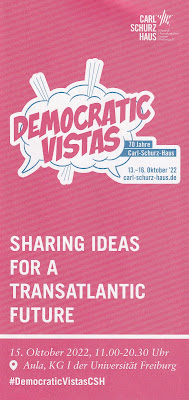| Der Mensch lebt durch den Kopf, der Kopf reicht ihm nicht aus. Versuch es nur; von deinem Kopf lebt höchstens eine Laus. Denn für dieses Leben ist der Mensch nicht schlau genug. Niemals merkt er eben jeden Lug und Trug. |
A man lives by the head but feels the head is not enough. Just try it; off your head subsists at most a louse. Since for this life, man isn't clever enough. He simply never notices all lies and swindles. |
Why are there so many lies, meanness, aggression, and violence? Why can't we live together in peace?
For thousands of years, people in various forms of government have tried to regulate their coexistence with the help of religion and laws. Almost always with the threat of punishment in this world or the next for misdeeds against fellow human beings. Such exercises are as old as the human race they will always accompany.
Many ethicists think there is still a lot of animalism in the human mind. However, in the animal kingdom, many species live well together, mainly under the leadership of a leading bull or, better even, a leading cow.
The other day Red Baron had an intuition during a conversation with a circle of friends. It struck him that in the three languages he knows, three statements describe sides of human life perfectly.
First, I would like to mention Brecht again, who wrote: Erst kommt das Fressen, dann die Moral mildly translated into First comes the food and then the morals. In other words: The essential prerequisite for a reasonably orderly coexistence is that everyone has enough to eat.
Brecht wrote this statement in the ballad "Wovon lebt der Mensch" (What
Man Lives From)" also for the Threepenny Opera. Did he mean that the basic
need to fulfill nutrition is more important than the need for a moral order?
Only when survival is ensured for the organism can man begin to integrate
himself into ethical systems and create basic structures which enable a
peaceful and balanced life with each other.
In English, sentences from the movie Casablanca often come to my mind. These are from the famous song: As time goes by with the lines: It’s still the same old story, a fight for love and glory, a case of do or die.
And indeed. When I look into history, the fight for love and glory usually turns into a dirty war for sex and domination.
What do you think follows from this observation? Do the French perhaps have the answer?
In English, sentences from the movie Casablanca often come to my mind. These are from the famous song: As time goes by with the lines: It’s still the same old story, a fight for love and glory, a case of do or die.
And indeed. When I look into history, the fight for love and glory usually turns into a dirty war for sex and domination.
What do you think follows from this observation? Do the French perhaps have the answer?

|
*





































_(4528251664).jpg)




